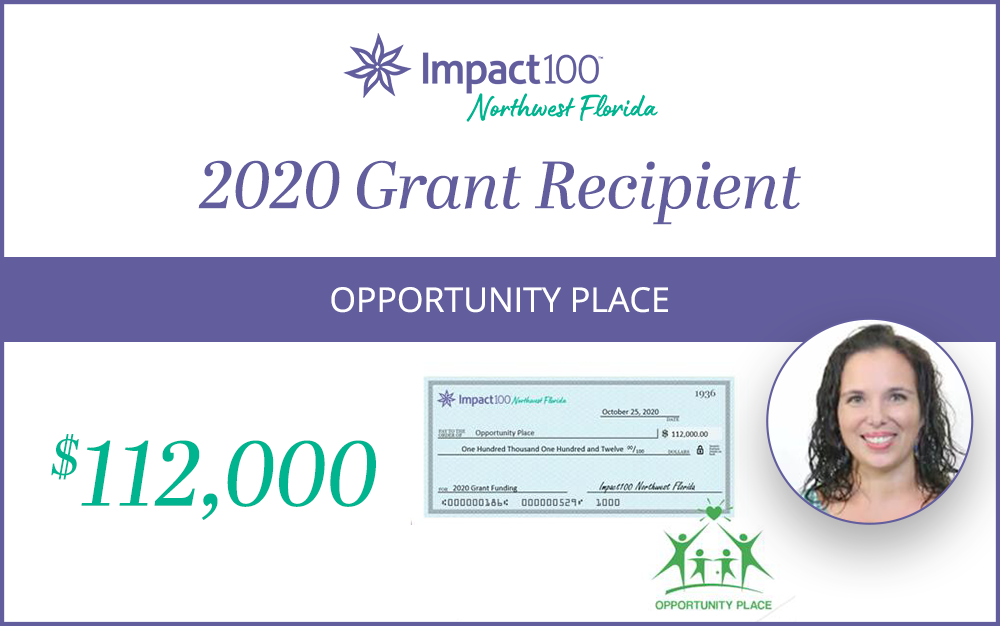Project:
First Steps Housing, Counseling, and Education Center
Forty percent of people who exit homelessness into housing will re-enter homelessness within two years: thus housing crises become cycles that define families and communities for extended periods of time. Addressing these cycles requires more than providing shelter to those most in need. It requires investing resources in prevention, education, and stabilization. It requires that the entire organization address the trauma associated with homelessness. First Steps Empowerment Center tackles these problems by providing office and classroom space that will allow Opportunity Place to expand its programming and conduct its work in an environment that is trauma informed.

Opportunity Place is an emergency shelter for families and women experiencing homelessness in Okaloosa and Walton Counties. Every month we receive between 50 and 100 calls from families and individuals seeking help. Our shelter has eight family rooms and four beds for single women. The need far exceeds capacity, and the number at risk is climbing as the economic fallout from COVID hits home. Homelessness is traumatic and even those who are sheltered face daunting odds as 40% of people exiting homelessness into housing will re-enter homelessness within two years. Thus, housing crises become cycles that define families and communities for extended periods of time. Addressing these cycles requires more than providing shelter to those most in need. It requires investing resources in prevention, education, and stabilization. It requires that the entire organization address the trauma associated with homelessness.
In February, Opportunity Place's Board made a commitment to do just that. They adopted the ambitious mission of ending homelessness for families and women in Okaloosa and Walton Counties, and laid out a 5-year plan to accomplish that mission. That plan includes expanding programming to include prevention so the cycle of homelessness is stopped before it starts, and stabilization so clients receive the support and financial counseling they need to remain housed and financially stable. It includes a commitment to becoming a trauma-informed organization.
The First Steps Housing, Counseling, and Education Center is at the core of achieving this larger vision. It will enable us to expand programing and to conduct our work in a trauma-informed space. The center, which will include two classrooms and four offices, will be the community entrance to Opportunity Place. The children's classroom will host our "Love Your Art" program, which brings music, dance, yoga, and fine arts enrichment activities to our shelter. The adult classroom will host weekly empowerment workshops put on by community groups: tenant education classes by Legal Aid, parenting classes by the Early Learning Coalition, financial literacy classes by Synovus, and more. The offices will be used for case management, tele-health, and community outreach.
This space is vitally needed. Despite receiving funding for prevention and rehousing, we have not expanded staffing due to limited office space. The case manager's office is in the kitchen. The family service coordinator does play sessions in our storage room. Community food distribution takes place in the main dining area. This project would change all of that. Children could enjoy music without disturbing people. Residents could work through their case plans in a therapeutic space. We could provide food to the community without impinging on residents' privacy. It would fundamentally transform the way we deliver services by creating a trauma informed space conducive to healing and progress.
Investing in the First Steps Housing, Counseling, and Education Center will have both an immediate impact on our current clients and a long-term impact on our community. The immediate effects are described above: clients' living space will be more private, their therapy sessions will be held in a therapeutic environment, their children will have dedicated space for enrichment. These effects require no additional funding. The space itself is impactful.
The long-term effects will be both deep and broad. Broad because the classrooms enable us to offer our education programming to the wider community. Deep because reducing trauma and investing in stabilization is what breaks the cycle so that our clients' children do not find themselves back at our doors in adulthood. These longer-term effects require additional investment from the community to support ongoing programming, but those investments are already being made. We have commitments from 3 community partners to offer educational classes. We have received grants to fund prevention and expand our rehousing program. With commitments from multiple organizations, we are well on our way to executing the five-year plan laid out in February.
Impact 100 will transform our organization and our community with this grant. By funding the First Steps Housing, Counseling, and Education Center you will help us end homelessness in our community. You will help us break generational cycles of poverty. You will lay the foundation for a stable, healthy future for the many families working hard to rebuild their lives at Opportunity Place.